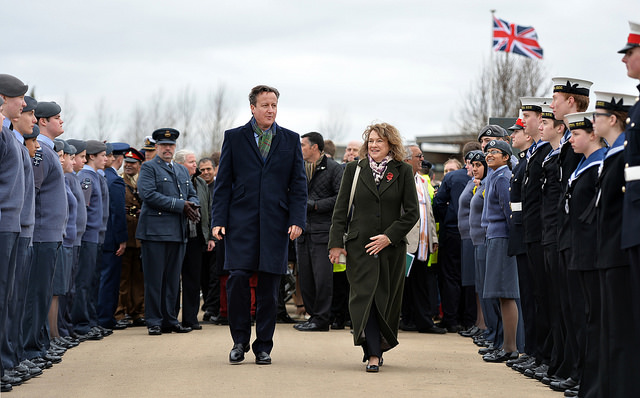The 32nd British Social Attitudes Survey sheds a light on the public opinion trends that will decide the General Election
Today NatCen Social Research releases the 32nd British Social Attitudes report, which provides information about the way the British public view society. Here, NatCen’s Cheif Executive Penny Young previews some key findings, which are sure to influence the electorate’s voting behaviour in May’s General Election.

Credit: Number 10, CC BY NC SA 2.0
Today we’re publishing the 32nd British Social Attitudes report, in time for the public, politicians and commentators to absorb the findings as we gear up for May 7th. Here’s a quick guide to British Social Attitudes’ answers to three big election questions.
First, how has the public reacted to five years of radical reform in an age of austerity? The answer is, compared with historical precedents, somewhat quietly. The public has accepted many of the coalition’s reforms to the public sector, including reform of the NHS, cuts to benefits and the rise in tuition fees. In previous recessions we have seen a rise in support for public spending, but the public seems to have accepted the need for austerity.
For example, in spite of pressure on incomes and working age benefits, only 30% want to see more government spending on welfare benefits. This was 61% in 1989. Satisfaction with the NHS (including A & E) has increased in the past year (after a real wobble). And most people in England believe that at least some students should pay tuition fees. Even in Scotland where there are no fees, most people think there should be. There are some wrinkles (eg some signs of lower satisfaction with GPs services) – but overall, given the extent of changes, the attitudinal reaction is not huge.
Second, what has happened to the political landscape? Back in 2010, Nick Clegg (perhaps somewhat rashly), promised to renew our faith in politics. This hasn’t happened (yet, anyway). In fact, the public has also gone off the principle of coalition – people’s preferences have shifted back to single party government. Although of course, there is a strong likelihood that they won’t agree on which single party they want to lead us! But what we have seen is the extraordinary rise of UKIP. We’ve taken a close look at UKIP supporters in this report.
UKIP supporters are anti-immigration, anti-Europe and socially conservative. They’re more likely to support tougher sentencing, the death penalty, and to believe young people don’t have enough support for British values. No surprises so far. But in addition to being disproportionately working class, UKIP supporters are particularly likely to believe that there is one law for the rich, and another for the poor, and to believe that the gap between the two is too wide.
They are not keen on government intervening to redistribute wealth though – perhaps because they are particularly cynical about establishment politicians, and feel they don’t have a say in government decision making. Our assessment is that UKIP supporters have a very distinctive profile, and should not be dismissed as a protest vote.
Finally, what are the big troublesome issues that could trip any new government up?
- Europe – an issue that retains its special power to cause British politicians headaches. Should we stay or should we go? BSA shows that there is significant pressure to devolve some powers back to Westminster. While nearly two-thirds (62%) of Brits could be considered Eurosceptic, just 24% say they want to leave the EU while 38% say they’d prefer a significant reduction in powers. If there is a referendum (not a guarantee of course), the pressure to deliver a successful renegotiation of powers is going to be intense.
- Pensions – a sacred cow worth protecting? Pensions remain the public’s favourite area for additional welfare spending. However we have seen a drop in the proportion that place pensions among their top priorities for extra spending, down from 80% in 2005 to 67% today. Conversely, the proportion favouring extra spending on benefits for disabled people has increased from 53% in 2010 to 60% in 2014. If this trend continues it may not be long before these two groups switch places.
- How to fix the NHS. All parties are promising increased investment. And this isn’t surprising: virtually everyone (92%) thinks there’s a funding crisis. In fact, nearly half (45%) that some elements will be privatised in the next ten years. But there’s no consensus on how to deal with it – no options are popular. It will require strong leadership and persuasiveness to tackle this problem.
—
This post represents the views of the author only, and not those of Democratic Audit UK, the LSE Public Policy Group, or the LSE. Please read our comments policy before posting. For more information about the Social Attitudes Survey, please see the NatCen press release which is available here. The report homepage is here.
—
 Penny Young is Chief Executive at NatCen Social Research
Penny Young is Chief Executive at NatCen Social Research





 Democratic Audit's core funding is provided by the Joseph Rowntree Charitable Trust. Additional funding is provided by the London School of Economics.
Democratic Audit's core funding is provided by the Joseph Rowntree Charitable Trust. Additional funding is provided by the London School of Economics.
Interesting overview of British Social attitudes and #GE2015 over on @democraticaudit https://t.co/YGm5Xpt51h
British Social Attitudes – % favouring extra spending on disability benefits up from 53% in 2010 to 60% in 2014 https://t.co/lPJRBi3xSB
RT @LSEPubAffairs: The 32nd British Social Attitudes sheds a light on the public opinion trends that will decide the General Election http:…
The 32nd British Social Attitudes sheds a light on the public opinion trends that will decide the General Election https://t.co/TqOius4AV9
The 32nd British Social Attitudes sheds light on the public opinion trends that will decide the election https://t.co/8XJMRLMxsG #BSA32
Numbers favouring extra spending on benefits for disabled people increased from 53% in 2010 to 60% in 2014 https://t.co/ndnwtDR24W
The 32nd British Social Attitudes sheds a light on the public opinion trends that will decide the General Election https://t.co/3uM28jI3Ju